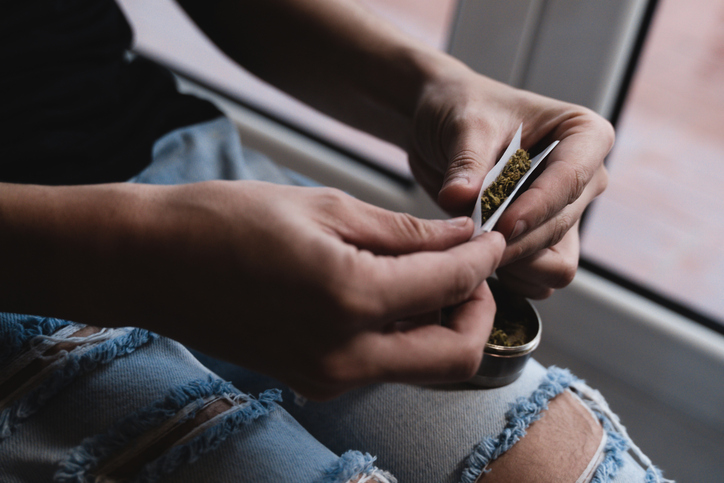The Biden administration will reclassify marijuana as a less dangerous drug with fewer restrictions on its use under the 1970 Controlled Substances Act, according to news reports.
The Drug and Enforcement Administration (DEA) recommended changing the status of marijuana from Schedule I to Schedule III to the White House on April 30, the Associated Press reported. President Biden directed the U.S. Department of Health and Human Services (HHS) to review the classification of cannabis in 2022, and the HHS recommended switching marijuana to a Schedule III drug, which is defined as having “a moderate to low potential for physical and psychological dependence.”
The proposed reclassification would move marijuana from the same category as heroin to the same list as ketamine and some anabolic steroids. After the reclassification is reviewed by the White House Office of Management and Budget, it must undergo a public comment period.
Not ‘for Recreational Purposes’
The reclassification “changes nothing,” said Jeffrey Singer, M.D., a surgeon and senior fellow at the Cato Institute.
“It will still be federally illegal to buy, sell, or use marijuana for recreational purposes in the U.S.,” said Singer. “I don’t need a prescription to buy my recreational drug of choice, bourbon, from my local liquor store. And alcohol has a ‘high potential for abuse’ and is much more physically harmful than marijuana.”
‘Cannabis Has Medicinal Uses’
In a blog post on the DEA decision, Singer wrote that the downgrade is a positive move for patients and taxpayers.
“The good news is that the federal cops practicing medicine—the DEA—finally recognize that cannabis has medicinal uses,” wrote Singer. “Rescheduling should make it easier for patients to obtain the drug with a prescription in the states that have not yet legalized medicinal cannabis.”
Though 38 states and the District of Columbia have legalized medicinal cannabis, research on the drug has been limited by its Schedule III status, says Singer.
“It will also make it easier for researchers to perform high-quality studies on the plant’s medicinal uses,” wrote Singer. “And it will make it easier for cannabis retailers to take federal tax deductions from which the law has barred them.”
Bad Move, Say Congressmen
Downgrading marijuana to a Schedule III drug is a cause for alarm, according to Rep. Pete Sessions (R-TX), who drafted a bicameral letter last year urging the DEA to leave marijuana’s classification alone, and this year led to a bipartisan and bicameral letter signed by 49 lawmakers to Attorney General Merrick Garland on illicit marijuana operations linked to drug cartels and China.
We don’t know enough about the dangers of marijuana, particularly with the concentrations of tetrahydrocannabinol (THC) in cannabis today, stated Sessions, in a May 1 news release.
“Marijuana with high levels of THC is not only more addictive, but also more dangerous, especially for children and young adults,” stated Sessions. “The rescheduling of marijuana will lead to more illicit marijuana farms to produce dangerous strains of marijuana that will be then sold to children and adults alike throughout the United States.”
Sessions says the reclassification ignores science and public safety.
“The Centers for Disease Control (CDC) has linked marijuana use to thoughts or feelings of anxiety and paranoia and higher THC levels make it more likely to develop temporary psychosis and long-lasting mental disorders, including schizophrenia, suicidal thoughts, suicidal attempts, and suicide,” said Sessions.
Promises vs. Reality
“I actually understood the initial Libertarian reasoning for legalizing many currently illegal drugs,” said Chad Savage, M.D., the founder of YourChoice Direct Care and president of DPC Action.
“Their general contention was that people were going to use them regardless of their legality, [and] by legalizing them we would minimize excess incarceration and reduce the violent and dangerous drug trade, thus making our borders and streets safer,” said Savage. “By making them legal, we could ensure the purity of what was being used and minimize other toxins from being incorporated and use the tax receipts to fund treatment and public outreach programs with the intention of actually decreasing use.”
The experience after years of legalization has been different, says Savage.
“The tax receipts have largely not gone to prevention or treatment programs as promised and what has been accomplished is the de-stigmatization and easing of access to these mind-altering substances and the deleterious effects they have had on the youth who predominantly engage in recreational use,” said Savage.
Not for Kids
Singer says many of the arguments Sessions makes against reclassification are based on poorly performed studies that are “observational and correlative.”
“In other words, it is bad science, like a lot of the ‘science’ that influenced COVID policy, said Singer. “And making the drug Schedule III means it still requires a doctor’s prescription. By what logic does Rep. Sessions conclude that this will lead to more children using marijuana? You need a prescription for Ambien—does this mean kids are getting access to Ambien?
“Nobody is calling for legalizing marijuana for kids—just like we don’t advocate the legalization of tobacco or alcohol for kids. Legalizing the drugs makes it more difficult for kids to obtain them from retailers than leaving them to the black market to provide them.”
It is clear more studies on the effects of marijuana are needed before making any changes, says Savage.
“I personally would call for a non-partisan, thorough review of all states that have legalized marijuana and compare pre- and post-legalization outcomes related to marijuana,” said Savage. “I think it would be irresponsible to expand access until we better know if doing so is unsafe.”
AnneMarie Schieber (amschieber@heartland.org) is the managing editor of Health Care News.
